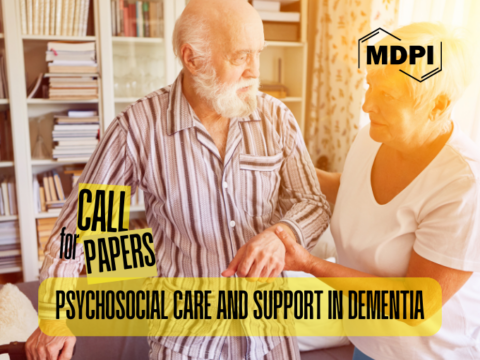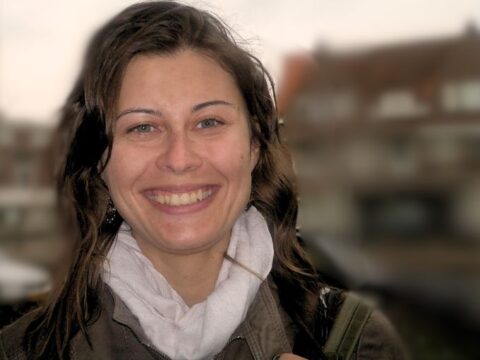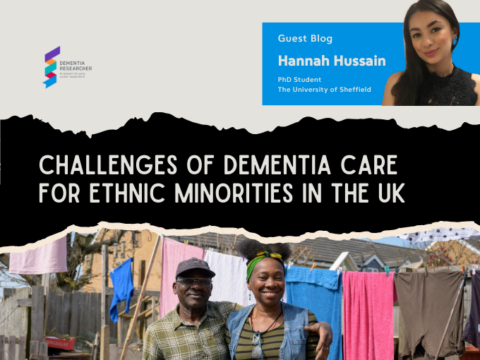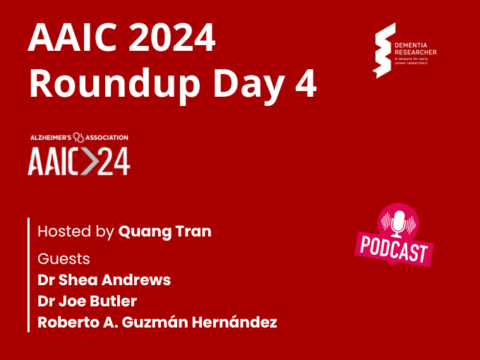Time for Dementia is an exciting, innovative and award-winning educational programme. Funded by Health Education Kent, Surrey and Sussex it provides undergraduate healthcare professionals with on-going, regular contact with a person with dementia and their carer, designed to create a new generation of healthcare professionals who are more aware and understanding of dementia
Due to the success of the programme, Time for Dementia has been embedded as a mandatory part of the curriculum for 1st year nursing and paramedics students at the University of Surrey and 2nd year medical students @ Brighton and Sussex Medical School.
In this podcast Dr Lakshini Mendis welcomes three guests to discuss the programme and its success:
Dr Stephanie Daley, a clinical research fellow at the centre for dementia studies at the Brighton and Sussex Medical School – Stephanie works at the programme and evaluation lead for Time for Dementia programme
Gina Sherlock, a research assistant on the Time for Dementia programme also at the centre for dementia studies
Ellen Jones, a carer for her mother who was diagnosed with Alzheimer’s Disease and Vascular Dementia 9 years ago. Ellen and her mother were amongst the 1st cohort of families to be involved in Time for Dementia.
Voice Over:
Welcome to the Dementia Researcher Podcast brought to you by dementiaresearcher.nihr.ac.uk, a network for early career researchers.
Dr Lakshini Mendis:
Time for Dementia is an exciting, innovative and award-winning educational program designed to create a new generation of healthcare professionals who are more aware and understanding of dementia. Time for Dementia was funded by Health Education Kent, Surrey and Sussex, and provides undergraduate healthcare professionals with ongoing regular contact with a person with dementia and the carer. Due to the success of the program, Time for Dementia has been embedded as a mandatory part of the curriculum, the first year nursing and paramedic students at the University of Surrey and second year medical students at Brighton and Sussex Medical School.
Dr Lakshini Mendis:
My name is Lakshini Mendis and I’m a research assistant at the National Institute of Health Research, and I’m delighted to welcome our three guests today to discuss the program and its successes. So, we have Dr Stephanie Daley.
Stephanie Daley:
Hi there.
Dr Lakshini Mendis:
A clinical research fellow at the Centre for Dementia Studies at Brighton and Sussex Medical School. Stephanie, who has a background in OTU works as the program and evaluation lead for the Time for Dementia Programme. Next we have Gina Sherlock.
Gina Sherlock:
Hi.
Dr Lakshini Mendis:
A research assistant in the Time for Dementia Programme, also at the Centre for Dementia Studies. And finally we have Ellen Jones.
Ellen Jones:
Hello.
Dr Lakshini Mendis:
A carer for her mother, Jane, who was diagnosed with Alzheimer’s disease and vascular dementia 10 years ago. Ellen and Jane were amongst the first cohort of families to be involved in the Time for Dementia Programme. So welcome everybody. First of all, I’d like to ask Gina if she can share a little bit more about the program and how it came about.
Gina Sherlock:
So work on Time for Dementia started in 2014 and it’s funded by the Health Education England Kent, Surrey and Sussex, as part of its skills development strategy in dementia, which was set up to prioritize action on dementia and educate and train all levels of the workforce to improve dementia diagnosis rates, treatment and care. So looking at more traditional models of healthcare, healthcare education has been delivered through a series of time limited clinical placements which provide students with a snapshot of different illnesses with an emphasis on the acute phase of illness. And so Time for Dementia in contrast to this, uses what’s called a longitudinal clerkship model of education, which emphasizes continuity of learning experience and enables ongoing patient contact. And so providing undergraduate healthcare professionals with ongoing regular contact with a person with dementia and their carer.
Gina Sherlock:
Time for Dementia aims to provide students with a unique opportunity to understand what it’s like to live with dementia and from this to develop a more positive attitude towards the illness as well as in depth knowledge about the condition. And in addition, it aims to enhance and develop skills which can be applied to practice upon qualification. So students are paired with a family and the family consists of a person with dementia and their carer and the students visit the family about three to four times a year for up to two hours at a time over the duration of two years. And it’s hoped that this contact over time improve student attitudes and empathy towards dementia as well as improving their knowledge of the condition.
Dr Lakshini Mendis:
Great. Sounds like a great program. I want to learn more. So the program has been running since 2014. Stephanie, since you’re the program and evaluation lead for Time for Dementia, can you share with us how you measure students’ satisfaction with the program and any feedback that you’ve had from them?
Stephanie Daley:
Yup, so the evaluation of Time for Dementia is a mixed methods evaluation. So in terms of student outcomes, we are looking quantitatively at what changes in student knowledge, attitude and empathy over time. So we’re looking at baseline 12 months and 24 months for students doing the program as well as comparison groups of students who are not doing the program. So we can look at differences. And what we’ve began to see in our data is that we’re seeing statistically significant change for the students doing the program, but we’re also interested to understand the experience for students. So we have also, for all of the students taking part, we’ve been looking at satisfaction surveys but also undertaking focus groups and qualitative interviews. And for the students, what they’ve talked about is just having a much more in depth understanding of the perspective of the person with dementia, but also understanding more about the concerns for carers and what the impact on carers and broadly in deepening their psychosocial understanding of dementia. So going beyond signs and symptoms to just understanding the more global impact of living with the condition.
Dr Lakshini Mendis:
Perfect. Sounds like a great program. It’s already achieving what it set out to. And what about the family perspective? Do you evaluate sort of [crosstalk 00:05:44]?
Stephanie Daley:
Yep, we do. So we’re looking at quantitative changes in the family for the person with dementia and the carer and looking at how that changes over time. And again, we’ve looked at family satisfaction. So looking at that both from the perspective. So using a survey, both with the person with dementia and their carer. And we’ve also been doing some qualitative interviews. And I know Ellen’s going to talk more today about her experiences, but in general what we’re seeing from the families is that there’s value from feeling that they’re contributing. So they’re making a difference for the workforce of the future. Certainly for the person with dementia, there seems to be a benefit of it being both enjoyable and the experience of having somebody who’s interested and wants to learn from them. And for the carer, often the experience is beneficial in terms of sharing how life is for them and being able to express some of their concerns. So those are, again, some of the things that are coming up, but we are continuing… The evaluation of the program is iterative and it’s continuing into the foreseeable future.
Dr Lakshini Mendis:
Great. So as I mentioned, Ellen and her mother, Jane, have been among the first families that were involved in the program back in 2014. So Ellen, why did you decide to get involved with this program?
Ellen Jones:
When I was part of a research network already and when I heard about Time for Dementia, I was really interested in it. My mother had been a deputy head mistress and been a teacher and involved in education all her life and she was a really community, she is a really community minded person. So this idea of her with me being able to contribute to the education of medical professionals just seemed really, really to fit well. And I think also we had had some mixed experiences of all contact with health professionals during the time that my mother had had dementia. So from really good experiences to really not very good experiences. So I think for me, the idea that my mom and I could contribute and actually make a difference to healthcare professionals attitudes and empathy and the experience of people with dementia in the future just seemed really a great idea.
Dr Lakshini Mendis:
That sounds great. And so you were chatting to me about your mom and how she’s progressed obviously, in her dementia a little bit more. So she’s now in a care home, is that right?
Ellen Jones:
She is. And actually she’s been in a care home ever since we started our involvement with the program. So her dementia is now… She’s in quite late stage dementia. And we weren’t sure how it would work, but actually it’s been a really fantastic and enriching experience for all of us. So for my mom, she’s very frail, she’s bedridden and she so enjoys the contact with the students. These wonderful young people who come and spend time with her who are really interested in her. And I can see their confidence in communicating with her really increase over the life of the program. And they also, the students also see really great practice in the care home and have an opportunity to talk to care home staff.
Dr Lakshini Mendis:
It’s almost this other dementia [crosstalk 00:09:45] to it as well.
Ellen Jones:
Exactly. That’s worked really, really well. Yes. So it’s been good.
Stephanie Daley:
And I want to really building on what Ellen is saying, one of the things that we have always hoped to do with Time for Dementia or about dementia, it is it provides other opportunities. So often the people living with dementia that the students visit, there’ll be other things going on with their physical health or in the example of Ellen’s mom, it’s about understanding that care home setting in a way that the students wouldn’t get ordinarily from their placement. So it gives a much broader understanding of those sorts of things of navigating health and social care factors that, again, the students don’t get in the classroom and don’t typically get on ordinary clinical placement.
Ellen Jones:
Yeah, I think it’s a really rich experience and just really wide learning for the students. And also because it’s over time, the students really develop a relationship. So-
Dr Lakshini Mendis:
Strong [crosstalk 00:10:46].
Ellen Jones:
Those as my mom and with me.
Dr Lakshini Mendis:
Yeah, Ellen, so obviously then the regularity of that contact and the ongoing contact as well. So you mentioned it’s about three to four visits a year over a two year period. Gina, maybe you could tell us a little bit more about how, obviously that takes some organizing and so how do you manage the contact between the students and these families?
Gina Sherlock:
Okay, so at each university, there is a Time for Dementia administrator, which helps organize the student visits. So students are divided into pairs and each pair of students is assigned a family who’ve signed up to take part in the program. And the family then receive a letter from the university administrator, which just details who their students are so they know who to expect. And then students are asked to call the family themselves to arrange the visits.
Gina Sherlock:
And the students attend a prep session before their visits, so they’re aware of how many visits they’re expected to make and how to contact their family, but the Time for Dementia administrator is always there to help with organizing the visits. And they’re there for the students, but also for the families as well. So as you said, the regularity of contact is really important as we found from initial qualitative analysis of student feedback that the relationship that builds up with the family over time is a really important factor in student learning. So students have reported that they feel that the developing relationship means that they’re able to tackle deeper questions with the families and that they feel that the families become more comfortable disclosing personal information and feelings and worries, and that’s what really makes up the rich learning that the students get from the program.
Dr Lakshini Mendis:
[inaudible 00:12:54]. And Ellen, do you find that your mum, as the visits have continued, what she’s sharing with the students, do you get a different perspective of her journey through dementia as well or is that…Ellen Jones:
I think so, yes, but I think the other thing is just watching the students get that perspective. And we’ve had some really great things. So my mother has always loved literature and poetry and she loves being read to. And her language is quite limited now, but she gets enormous pleasure from poetry. And so it’s been great to see the students engage with her and read poems to her. And one of the students said to me, she said, “Oh, I haven’t done this since I was 12.” But she really got into it and my mother was smiling. She was just really, really enjoying that contact. So it’s about, you learn about each individual and what works for them and about their history and their life. So again, it’s really holistic I think, and as Gina says, it’s very much about building that ongoing relationship and the confidence and skills about how to communicate and engage with somebody with dementia and maybe somebody-
Dr Lakshini Mendis:
[crosstalk 00:14:25].Ellen Jones:
Yeah, exactly. Exactly.
Stephanie Daley:
And I think maybe, Ellen, to really think about your mum where her dementia is more advanced, I guess one of the things that the program does is challenge those assumptions that if somebody isn’t able to communicate verbally, then it doesn’t matter what you might say or you don’t need to engage them. I think particularly, it opens up the need for the students, but also as future professionals that the emphasis is on them to find a different way to communicate and that there is a lot you can do still. And I think that’s really-
Ellen Jones:
Absolutely.
Stephanie Daley:
That comes from that experience, doesn’t it?
Ellen Jones:
Doesn’t it?
Stephanie Daley:
And not, again, not what we can teach in the classroom.
Ellen Jones:
Yeah, I think there’s lots of… A lot of the things you hear about dementia are very negative and obviously the students are part of our community. There’s a lot of myths and stigma in our culture around dementia, and I think the Time for Dementia project really, really changes the understanding and perception of students about dementia and they see the person with dementia as a human being with all the qualities. And they also see that the key thing is our emotions and our feelings. And my mom, even though she might not be able to express things verbally, it’s absolutely clear that her feelings of that in the way she responds emotionally to the visits and to what the students are doing and saying. And that is the most important learning of all, that it’s about relationship, it’s about love, it’s about family bonds and the students feel that they’re part of that. That is their real experience. And that is what is so fantastic about Time for Dementia.
Dr Lakshini Mendis:
Yeah, it sounds like a great program. I’m just giving you… It’s amazing to be able to share that I guess, yeah, broader in-depth perspective and just an all-round experience and view of what dementia is. I think it is really easy to get caught up in the numbers, especially as a healthcare professional, but what you’re doing with this program is amazing and I think you’re achieving everything you’ve set out to fully, which is great. And so you’ve also… There’s a film up there for those of you who’d like to know more about this wonderful program. So in the film, medical student, Jaewon, talks about her time during and why she took part in the Time for Dementia Programme. And it’s only a short film, but it captures the student and family experience of that visit. And you and Jane were part of that Ellen. Is that right?
Ellen Jones:
We were. Yeah
Dr Lakshini Mendis:
Perfect.
Ellen Jones:
Yeah, Jaewon was one of the first students my mom and I had. There were two students and Jaewon was one of them. So it was a real pleasure and privilege to be part of the film. And what was so lovely was that when we were making the film, Jaewon had finished her contact with my mom and there’ve been quite a gap. It was a year, 18 months even, and when Jaewon came back and visited my mum in the care home, there was just this really lovely moment. My mum was so pleased to see her. There was a real recognition and a really warm response. So, yeah, it was a lovely thing to be part of.
Dr Lakshini Mendis:
That’s great. And is that something you see Gina? The students who are part of this program, will they maintain that contact or do they go back?
Gina Sherlock:
And so we work in partnership with the Alzheimer’s Society who find the families and take part in the program. But as well as finding the families for us, they’re also there as a support. So families can always get in touch with the Alzheimer’s Society with regards to the program and the Alzheimer’s Society call the families after the visits to find out how they were. Were there any sorts of issues that arose? But most of the time, our families just like to report that they really enjoyed the student experience.
Dr Lakshini Mendis:
Perfect. That sounds really great. So it seems like the Time for Dementia Programme is on the up and up. And Stephanie, do you have any plans to extend it either to other areas or different professional development courses or?
Stephanie Daley:
Yes, we do. So as you’ve said, it’s been a really positive program and in this academic year that we’re in, so we’re on our fifth cohort of students for nursing, paramedic and medical students. So we’re also in the process of rolling out the program across our local region, which is Kent, Surrey and Sussex. So we’re taking the program to three new universities, so the University of Greenwich, University of Brighton and Canterbury Christ Church, and we’re expanding the number of different professional groups doing the program. So as well as nursing, we’re also delivering the program to physiotherapy students, occupational therapy students, speech and language therapy students and radiography students.
Stephanie Daley:
So over the next couple of years we’ll be delivering the program to a further 1,500 students. In addition to that, we hope to roll out the program to the south of the country and also we’re in the process of really testing out this model that we’ve developed, so the time for model, and we’re in the process at Brighton and Sussex Medical School of setting up a program, a similar program for autism. So for children with autism, so it’s Time for Autism and we’re planning for that to start next academic year, so September, 2019.
Dr Lakshini Mendis:
That sounds great. We’re definitely going to be looking forward to that. Keeping an eye closely on the Time for Dementia Programme and then the Time for Autism Programme as well as it rolls out. Listeners, if you want to find out more about this wonderful program, we’re going to be posting a link to the film we mentioned on our Dementia Researcher website. We’ll also be posting contact details for the program, so make sure you visit our website and check out the profiles of all our panellists today.
Dr Lakshini Mendis:
Unfortunately, we’re running out of time, so I think I’d just like to finish off by thanking our panellists, Stephanie, Gina, and Ellen, for being here with us today.
Stephanie Daley:
Thank you.
Gina Sherlock:
Thank you [inaudible 00:21:35].
Ellen Jones:
Thank you.
Dr Lakshini Mendis:
If you have any questions for us, you can post it on our comments section and if you have anything to add on this topic, you can join our forum or drop us a line on Twitter using the hashtag #ECRDementia. We also suggest that you take a look at that essential tools that are part of our Dementia Research website where we have a section on ethics. Finally, please remember to subscribe to this podcast to SoundCloud and iTunes. Tell all your friends and colleagues about us. Thanks all.
Voice Over:
This was a podcast brought to you by Dementia Researcher, everything you need in one place. Register today at dementiaresearcher.nihr.ac.uk.
END
Like what you hear? Please review, like, and share our podcast – and don’t forget to subscribe to ensure you never miss an episode.
If you would like to share your own experiences or discuss your research in a blog or on a podcast, drop us a line to adam.smith@nihr.ac.uk or find us on twitter @dem_researcher
You can find our podcast on iTunes, SoundCloud and Spotify (and most podcast apps).

 Print This Post
Print This Post





